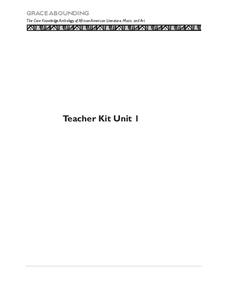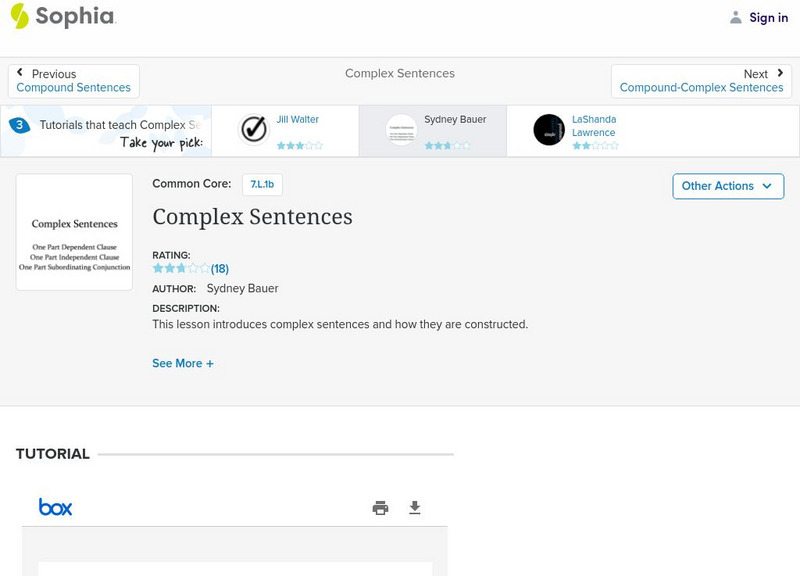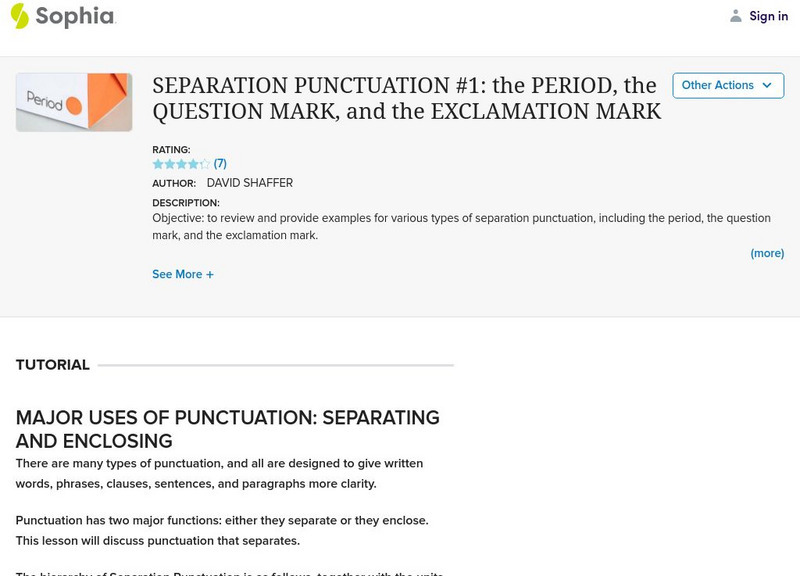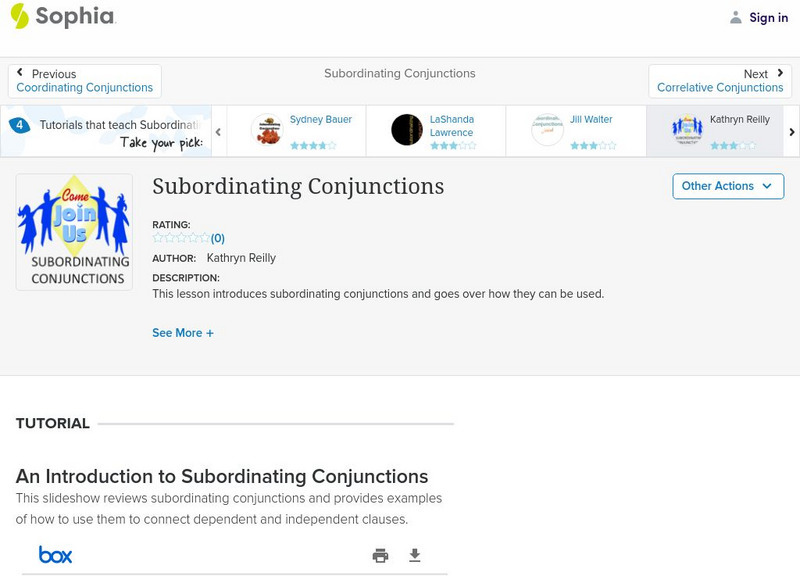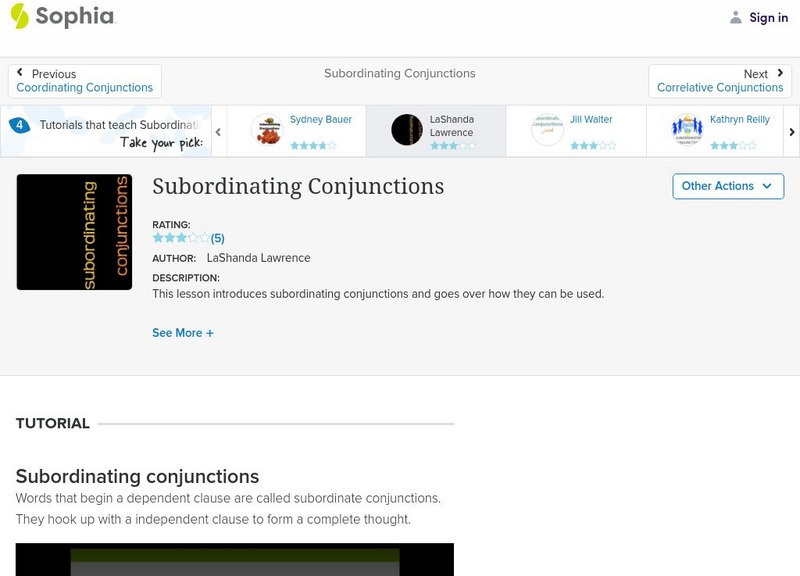BW Walch
Daily Warm-Ups: Grammar and Usage
If grammar practice is anywhere in your curriculum, you must check out an extensive collection of warm-up activities for language arts! Each page focuses on a different concept, from parts of speech to verbals, and provides review...
K20 LEARN
Sentence Structure in Siddhartha: Simple, Compound, Complex, and Compound-Complex Sentences
While wisdom may not be communicated, knowledge of sentence structures certainly can. Teach young grammarians the power of syntax with a lesson that uses Herman Hesse's Siddhartha as a mentor text. Learners first rewrite captions for an...
K20 LEARN
Say It with Style: Syntax and Parallel Structure
Dr. Martin Luther King, Jr.'s "I Have a Dream" speech provides the text for a instructional activity that introduces scholars to the significance of syntax. After examining several types of clauses, phrases, and structures, class members...
K12 Reader
Writing with Subordinating Conjunctions
Challenge young grammarians to turn sets of phrases into sentences by adding subordinating conjunctions on a short worksheet.
Rosetta Stone
Absolute Possessive Pronouns
Pronouns are meant to replace nouns in a sentence, but don't replace this resource so easily! A collection of worksheets challenges young grammarians with fill-in-the-blanks, word searches, and sentence diagramming.
EngageNY
Grade 9 ELA Module 3, Unit 3, Lesson 7
As the unit on research writing draws to a close, class members continue to revise and edit their papers, this time focusing on grammar, spelling, and punctuation (colon and semicolon).
Curated OER
Teacher Kit Unit 1
Nine lessons makeup a unit designed to reinforce grammar and vocabulary through practice pages based on readings of African folktales. Each lesson consists of a mini lesson, a vocabulary review, and a worksheet. Topics include...
Curated OER
Clauses and Phrases
Pupils examine sentence structure in a presentation that focuses on phrases, as well as independent and dependent clauses. The last five slides instruct learners to copy each sentence, underline the subjects, circle...
Pearson
Future Time Clauses
What will you do when you grow up? What are you going to do after school is over? Learn about future time clauses and how they connect to independent clauses with a helpful grammar presentation.
University of North Carolina
Relative Clauses
Knock, knock. Who's there? To. To who? No! To whom. Knowing when to use who versus whom is just one of the many topics covered on a handout about relative pronouns. Writers discover how to incorporate words such as whose, that, which,...
Santa Barbara City Collage
Connecting Independent and Dependent Clauses
Dependent, independent, coordination, and subordination. Everything you wanted to know about clauses, but were afraid to ask, recorded on this two-page information sheet.
Ms. McLaughlin's Homework Page
Simple, Compound, and Complex Sentences
Find out just how much your pupils know about simple sentences, subjects and predicates, sentence fragments, coordinating and subordinating conjunctions, compound sentences, complex sentences, and more! This review page includes...
Georgia Department of Education
Ga Virtual Learning: American Literature and Composition: Realism: Clauses
This lesson focuses on clauses including dependent, independent, adjective, adverb, and noun clauses. It also explains the use of subordinate conjunctions, relative pronouns, and relative adverbs and provides examples. It features a...
Sophia Learning
Sophia: Complex Sentences
This slideshow lesson focuses on complex sentences; it explains what makes up a complex sentence: independent clause, dependent clause, and a subordinate conjunction. It discusses placement, order, and how to punctuate them accordingly.
Sophia Learning
Sophia: Compound Complex Sentences
This slideshow lesson focuses on compound complex sentences. It explains what they are including the requirements, how they are put together, how to punctuate them, and provides examples showing the various sentence structures.
Towson University
Towson University: Ows: Dependent Clauses: Adverbial, Adjectival, Nominal
This entry defines dependent clauses including Adverbial, Adjectival, and Nominal; explains and lists their common introductory words, and provides examples of their uses in sentences.
University of Victoria (Canada)
The U Vic Writer's Guide: Grammar: Clauses
This site discusses the two main types of clauses. Content includes instructions for and examples of using clauses to build different types of sentences and information on recognizing types of clauses.
Sophia Learning
Sophia: Clauses
This slideshow lesson focuses on clauses; it defines the term and the two main types: independent and dependent. It lists the two types of dependent clauses: adjective and adverb; it provides examples of each, explains how to identify...
Sophia Learning
Sophia: Separation Punctuation
This website provides information about how to use separation punctuation. There is a video clip [0:47] on why periods go inside quotation marks, and a second video clip [1:07] showing the effects of using too many exclamation points.
Sophia Learning
Sophia: Subordinating Conjunctions
This slideshow lesson focuses on subordinating conjunctions by defining them, listing them, and providing examples showing placement and how to punctuate them correctly.
Sophia Learning
Sophia: Subordinate Conjunctions
This video lesson focuses on subordinate conjunctions; it defines them and related terms such as dependent and independent clauses, provides a list of common subordinate conjunctions, and examples of their use. It also covers how to...
Other
Tameri Guide for Writers: Clauses and Phrases
The first half of this tutorial on clauses and phrases covers topics such as independent clauses, dependent clauses, adjective clauses, adverb clauses, noun clauses, essential clauses, and nonessential clauses. The second part discusses...
University of Calgary
University of Calgary: Sentence Elements: Noun Clauses
This section of an online grammar guide provides instructions and examples for using subordinate (dependent) clauses as nouns in constructing sentences.
PBS
Pbs Learning Media: Learn About Dependent & Independent Clauses
A clause is a group of words that acts as a subject and a group of words that acts as a verb. A clause consists of a subject and a predicate, where the predicate is typically a verb phrase. [0:57]








